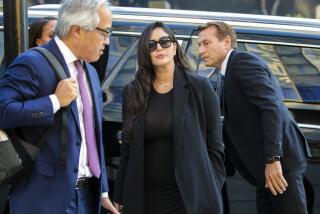Legal Bill Exceeds Plaintiffs’ Award
- Share via
Attorneys representing employees of an Anaheim-based insurance company have won fees totaling $2.1 million -- almost twice what their clients received in a settlement of their case over unpaid overtime.
Experts described the fee award, made Thursday by a federal judge in Santa Ana, as highly unusual. It came in a class action brought by telephone sales agents who claimed that Eastwood Insurance Services Inc. refused to pay them overtime pay as required by federal law.
Lawyers on both sides of the case agree that the plaintiffs’ legal bill was driven up by unusually protracted and acrimonious wrangling.
The class action included 156 past and current employees who sold auto policies from Eastwood offices in California and other states, earning an hourly wage plus sales commissions. They claimed that because Eastwood routinely required them to work 50 to 60 hours a week they were owed overtime pay under the federal Fair Labor Standards Act.
The company argued that the workers had managerial duties and were therefore exempt from overtime provisions.
The case was settled in May on the eve of trial with Eastwood agreeing to pay the plaintiffs $1.2 million in back wages and to institute overtime pay.
The company continued to contest the plaintiffs’ attorneys fee request as excessive, however. Federal law allows judges to order defendants to pay the plaintiffs’ legal fees in such cases. Those fees have ranged in similar cases from 25% to 40% of the total award, according to employment lawyers.
Aashish Y. Desai of Irvine-based Mower, Carreon & Desai, lead attorney for the plaintiffs, originally requested fees of $3.6 million, a figure he based in part on the nearly 5,000 hours he says he and his associates devoted to the case since 2002.
U.S. District Judge Gary L. Taylor on Thursday approved a fee award of $2.1 million. Even though Taylor’s award is lower than Desai’s original fee request, the Irvine attorney regards the ruling as an affirmation of his hard work on behalf of Eastwood’s workers.
The defendants “made their own bed in this situation and the judge forced them to lie in it,” Desai said.
Eastwood’s attorney, Sanford Michelman of Michelman & Robinson in Santa Ana, said the company might appeal the fee award, challenging the multiplier Taylor used to calculate it. He said the plaintiffs’ lawyers had rejected an early settlement offer of $3 million, more than double what the plaintiffs finally won.
“The plaintiffs’ lawyers decided not to take that offer because they wanted more fees,” he said. “So plaintiffs’ counsel are celebrating their fees but their clients got the short end of the stick.”
To David Lewin, a professor at UCLA’s business school who has studied the issue, the award “doesn’t smell well at all. There are often special circumstances in a case,” he said, “but I don’t think we want a system where attorneys walk away with more money than the claimants.”
Richard Simmons, an attorney with Sheppard Mullin Richter & Hampton in Los Angeles who has written several books on employment law and lectures frequently on the subject, says the case is “absolutely significant” and predicts it will be “fodder for plaintiffs’ lawyers who will try to use it to pressure employers to settle cases quickly.”
But plaintiffs’ lawyer David Borgen of Goldstein, Demchak, Baller, Borgen & Dardarian in Oakland says the “fear in these cases is that the employer could say ‘We’re going to drag this out and you’ll never be able to get your fees.’ ... Thankfully, the court didn’t buy that.”
More to Read
Inside the business of entertainment
The Wide Shot brings you news, analysis and insights on everything from streaming wars to production — and what it all means for the future.
You may occasionally receive promotional content from the Los Angeles Times.










